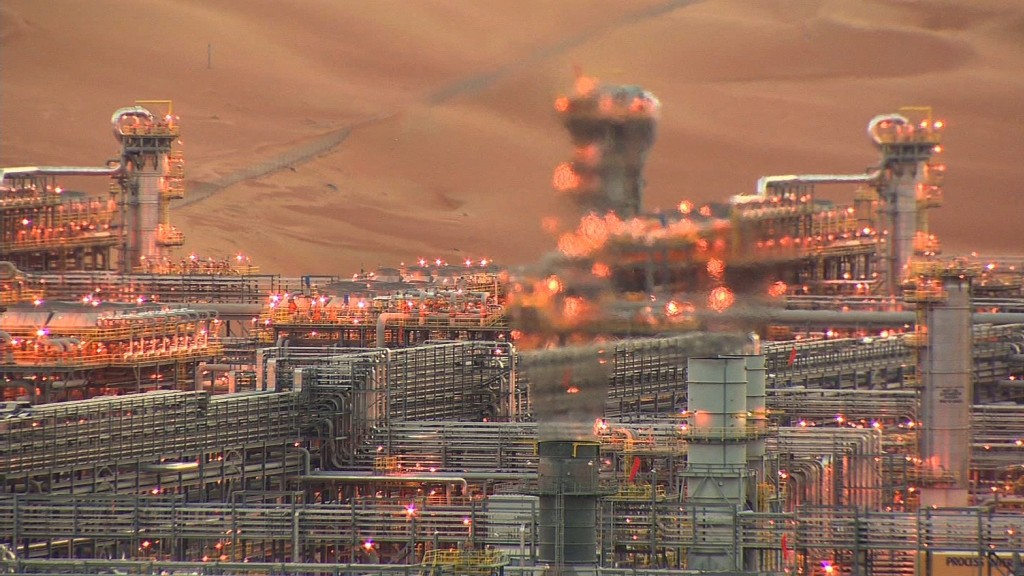
It's time for the oil industry's favorite guessing game: Will OPEC continue to flood the world with more oil, or will it finally blink and cut production?
OPEC reached a preliminary deal to much fanfare in September to cut output for the first time since 2008. That tentative agreement sent crude soaring above $50 a barrel.
But there's lingering skepticism over whether OPEC can really keep its word at Wednesday's meeting in Vienna. Internal squabbling among OPEC members -- especially Iran, Iraq and Saudi Arabia -- has made a concrete agreement difficult to achieve.
Many believe the chances of a significant OPEC supply cut are no better than 50/50. But the oil markets remain oversupplied, so any failure by OPEC to speed up the long-awaited "rebalancing" will likely spark a wave of selling.
Fadel Gheit, managing director of oil & gas research at Oppenheimer & Co., believes OPEC is unlikely to reach a deal -- and such a collapse in talks could easily send crude crashing back below $40 a barrel.
"At the end of the day, talk is cheap. If they don't do anything, oil will be cheaper," said Gheit.
Oil prices have rallied since plunging to a 13-year low of $26 a barrel in February. But much to the delight of this nation's car drivers, oil prices continue to remains down by over half from the summer of 2014.
Related: Saudis believe Trump will unleash U.S. economy
RBC Capital Markets also says $40 oil could be coming if OPEC drops the ball on Wednesday.
"This would represent a tremendous setback for the market-rebalancing act," Helima Croft, RBC's global head of commodity strategy, wrote in a recent report.
Antoine Halff, former chief oil analyst at the International Energy Agency, said the market is clearly "nervous" over OPEC's decision.
"The market has started to rebalance. A production cut by OPEC would speed up the process," said Halff, a senior fellow at Columbia University's Center on Global Energy Policy.
The key problem for OPEC has been that some members remain reluctant to cut production -- and Saudi Arabia has been unwilling to bear the pain alone.
The obvious holdout is Iran, which is determined to recover its oil output to pre-sanctions levels. It doesn't help that Iran and Saudi Arabia are longtime enemies that have been fighting proxy wars in Yemen and Syria.
"There is no love lost. They hate each other's guts," said Gheit.
Related: 2 powerful market forces could hurt Trump's plans
Other OPEC members are already producing well below their capacity, leaving little room for cuts.
Libya ramped up production to over half a million barrels a day in October -- but that's still just a third compared to the 1.6 million it pumped in June 2010 prior to the Arab Spring revolution in the Middle East.
Nigeria is pumping more than it did a few months ago but remains below its full potential. Iraq also continues to grapple with oil-related sabotage from ISIS and needs all the oil revenue it can get to keep up the fight against the terror group.
"The have-nots have nothing to give. It's very difficult," said Gheit. "OPEC has effectively been in a price war for over two years now. But nobody is blinking."
There's also concern over the ability of OPEC, notorious for cheating on its own quotas, to enforce any output ceiling given security concerns in many member countries.
"Implementation would be very difficult. Who is going to monitor the oilfields in Libya? No one is going to volunteer because they could be shot dead," said Gheit.
Sign up for CNNMoney's morning market newsletter: Before The Bell
Others are more optimistic about OPEC's ability to reach a consensus on some sort of a cut. RBC's Croft believes there's a 50% chance OPEC slashes production by 800,000 to 1.1 million barrels per day and a 30% chance of a smaller cut of 500,000 to 700,000 barrels.
"OPEC's leadership is cognizant of the risks posed by failing to reach a deal," Croft wrote.
If a large cut is announced, Croft said oil prices could soar to $55 a barrel or higher.
Any rally beyond that would be "short-lived," Croft said, because it would "open the door" for more pumping from non-OPEC producers, especially America's increasingly-efficient shale producers.


